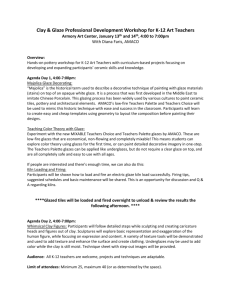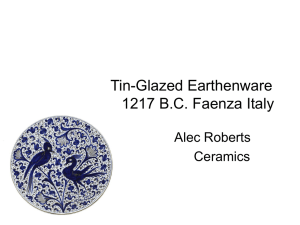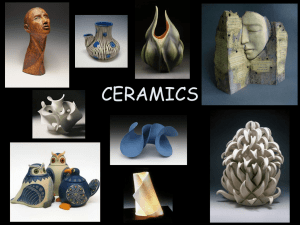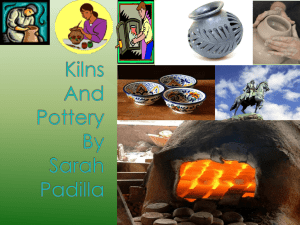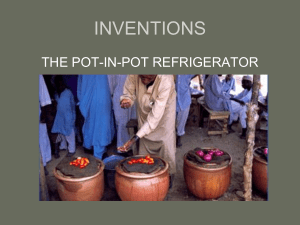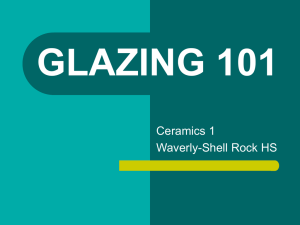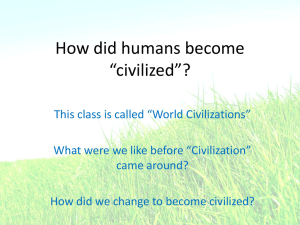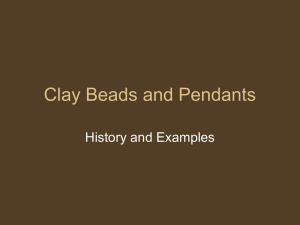Chapter 5: Surface Decoration
advertisement
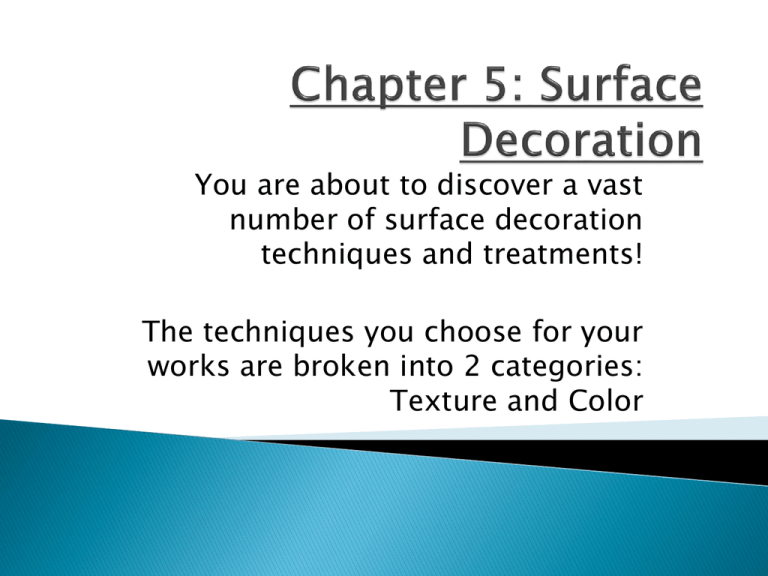
You are about to discover a vast number of surface decoration techniques and treatments! The techniques you choose for your works are broken into 2 categories: Texture and Color Clay surfaces have historically served as a means for artists, to realistically or with abstract design, to: ◦ tell a story ◦ Display symbols of religious significance ◦ Beautify a form You can add texture ANYTIME before a clay piece is fired Stages of Clay: ◦ Plastic: soft and flexible ◦ Leather-hard: most water has evaporated from the clay, feels cool to the touch. ◦ Bone dry: Almost ALL water has evaporated from clay – feels dry and chalky to the touch. IMPRESSING- best done when clay is soft ◦ Press with a tool into clay surface and the mark left becomes a low relief of your tool ◦ Tool possibilities include: fingernail, button, stamping tool, textured wooden beater, string, rope, burlap, lace, or whatever your imagination leads you to ◦ You can make your own stamp designs in little pieces of clay! INCISING AND APPLIQUE- can be done at any time in plastic and leather-hard stage ◦ INCISING- cutting into the surface of the clay ◦ APPLIQUE- applying one piece of clay to another – pieces can be coils , cut-out pieces of clay, pads, or clay designs that are pressed on the SOFT walls of a rim or a form …continued…. Incising and Appliqué… ◦ Add these to the surface of your piece by using a little pressure ◦ If surfaces have dried somewhat – you will have to slip and score the pieces for better adhesion PIERCING and BURNISHING- should be done when clay is leather-hard ◦ Creates dramatic effects ◦ Tools can be knives, hollow cutting tubes, anything that punctures clay BURNISHING – rubbing the surface of the clay smooth with a stone or the back of a spoon ◦ Produces a shiny finish ◦ Burnish at the leather-hard stage Adding color to your piece opens up enormous creative possibilities COLORED CLAY- mix different colored clays in the same piece INLAYING- fill in impressed or incised marks with soft clay of a contrasting color OXIDES AND CARBONATES- what gives clays, glazes and underglazes their colors are minerals and metals COLORED SLIPS◦ Slip is a mix of extremely fine clay with water ◦ Colored slip can be purchased to add to clay by painting or a dropper tool UNDERGLAZE – painting on the surface of greenware (or bonedry clay) before the first fire (bisque fire) SPONGING ◦ Vary from rough to smooth grain ◦ Give different textures and depth of color when daubed onto surfaces SPATETRING BRUSHING ◦ A toothbrush or a bristle brush can be used ◦ Paintbrush is good for blocking in areas of color or painting fine, delicate lines ◦ Can be used to finish details on top of a background, outline a design, or emphasize a certain aspect of the form MASKING ◦ Stencils can enclose or outline background shapes or foreground designs ◦ Cut out design from a piece of paper, lay the paper on the clay surface, apply color through the opening using one of the previous techniques ◦ Masking tape cut into lines or shapes also makes an effective stencil PAPER RESIST ◦ Cut shapes or patterns from damp paper and lay these shapes on clay surface WAX RESIST- use melted wax or white glue thinned with water ◦ - paint design on leather hard clay, then when wax is dry wipe away areas around it with a wet sponge. Top layers will melt away in kiln leaving a raised design ◦ Paint over waxed area with underglaze, the covered areas will remain clear and the unwaxed area will hold color ◦ Apply on bisqueware and it will resist any glaze that is applied ◦ Apply wax details OVER a glaze, brush or dip another glaze over it, or carve away areas of waxed area and apply glaze to the exposed surfaces SLIP TRAILING- squeeze a line of slip onto damp clay to produce a raised line ◦ Slip trailers can be made from pastry bags, mustard dispensers, rubber syringes SGRAFFITO- scratching designs into colored slip or glaze to reveal the clay body underneath MISHIMA – a pattern or design is incised or carved into the clay, slip is brushed on and then once dry – scraped off the raised areas so only the incised carving has the color TERRA SIGILLATA – exceptionally fine-grained clay suspension in water, similar to colored slip Transfer Printing – using etched plates Monoprints- a single print Photo Emulsions Computer Generated decal Transfers – using an image printed to transfer to surface of clay Glaze has the same characteristics as glass when it melts and fuses onto a clay surface All glazes made from 3 basic ingredients: silica, flux and alumina Low-Fire: The First Glazes (what we use!) ◦ Melt a relatively low temps High-Fire Glazes ◦ Used on stoeware and porcelain ◦ Must be fired at high temperatures Overglazes and Paints ◦ A low temperature glaze that goes OVER original glaze Clean pottery – wipe it with a damp sponge or rinse it quickly under the tap - dry Paint wax on (if using) May have to paint several layers – test thickness by scratching glaze with thumbnail. Should be the thickness of a card. Dipping – dipping glaze into large container filled with glaze Pouring- pour glaze inside piece and swirl around, pour out any extra back into glaze container Brushing – use a SOFT paintbrush to apply glaze ◦ Brush at least 3 layers onto piece in DIFFERENT directions ◦ Do NOT allow glaze to dry out before adding layers Spraying- using a spray gun or an airbrush to apply base glaze
